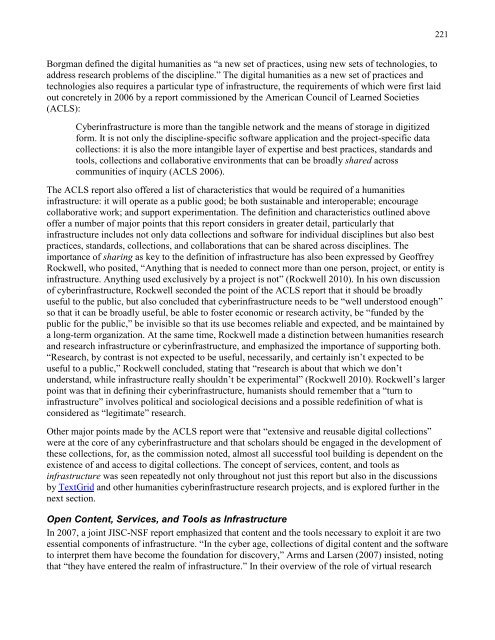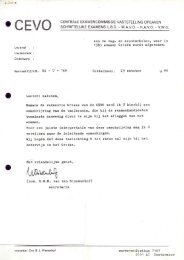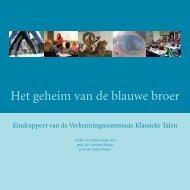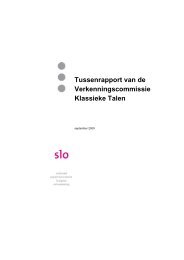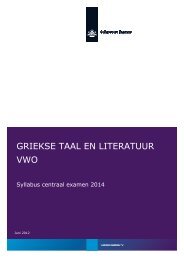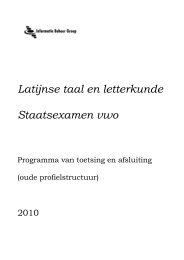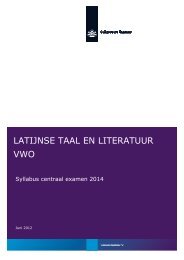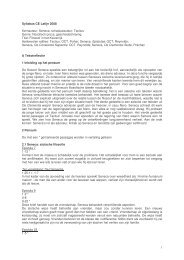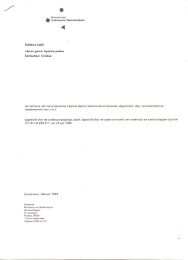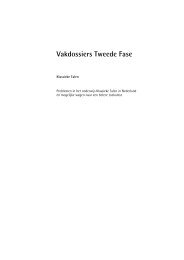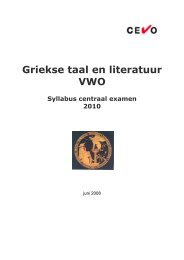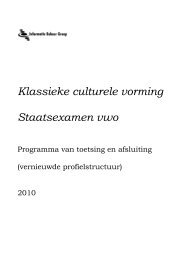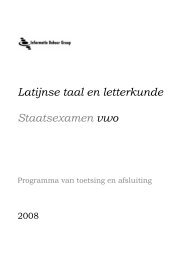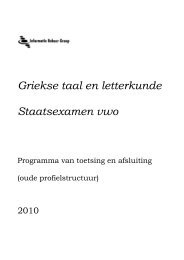Rome Wasn't Digitized in a Day - Council on Library and Information ...
Rome Wasn't Digitized in a Day - Council on Library and Information ...
Rome Wasn't Digitized in a Day - Council on Library and Information ...
You also want an ePaper? Increase the reach of your titles
YUMPU automatically turns print PDFs into web optimized ePapers that Google loves.
221<br />
Borgman def<str<strong>on</strong>g>in</str<strong>on</strong>g>ed the digital humanities as “a new set of practices, us<str<strong>on</strong>g>in</str<strong>on</strong>g>g new sets of technologies, to<br />
address research problems of the discipl<str<strong>on</strong>g>in</str<strong>on</strong>g>e.” The digital humanities as a new set of practices <strong>and</strong><br />
technologies also requires a particular type of <str<strong>on</strong>g>in</str<strong>on</strong>g>frastructure, the requirements of which were first laid<br />
out c<strong>on</strong>cretely <str<strong>on</strong>g>in</str<strong>on</strong>g> 2006 by a report commissi<strong>on</strong>ed by the American <str<strong>on</strong>g>Council</str<strong>on</strong>g> of Learned Societies<br />
(ACLS):<br />
Cyber<str<strong>on</strong>g>in</str<strong>on</strong>g>frastructure is more than the tangible network <strong>and</strong> the means of storage <str<strong>on</strong>g>in</str<strong>on</strong>g> digitized<br />
form. It is not <strong>on</strong>ly the discipl<str<strong>on</strong>g>in</str<strong>on</strong>g>e-specific software applicati<strong>on</strong> <strong>and</strong> the project-specific data<br />
collecti<strong>on</strong>s: it is also the more <str<strong>on</strong>g>in</str<strong>on</strong>g>tangible layer of expertise <strong>and</strong> best practices, st<strong>and</strong>ards <strong>and</strong><br />
tools, collecti<strong>on</strong>s <strong>and</strong> collaborative envir<strong>on</strong>ments that can be broadly shared across<br />
communities of <str<strong>on</strong>g>in</str<strong>on</strong>g>quiry (ACLS 2006).<br />
The ACLS report also offered a list of characteristics that would be required of a humanities<br />
<str<strong>on</strong>g>in</str<strong>on</strong>g>frastructure: it will operate as a public good; be both susta<str<strong>on</strong>g>in</str<strong>on</strong>g>able <strong>and</strong> <str<strong>on</strong>g>in</str<strong>on</strong>g>teroperable; encourage<br />
collaborative work; <strong>and</strong> support experimentati<strong>on</strong>. The def<str<strong>on</strong>g>in</str<strong>on</strong>g>iti<strong>on</strong> <strong>and</strong> characteristics outl<str<strong>on</strong>g>in</str<strong>on</strong>g>ed above<br />
offer a number of major po<str<strong>on</strong>g>in</str<strong>on</strong>g>ts that this report c<strong>on</strong>siders <str<strong>on</strong>g>in</str<strong>on</strong>g> greater detail, particularly that<br />
<str<strong>on</strong>g>in</str<strong>on</strong>g>frastructure <str<strong>on</strong>g>in</str<strong>on</strong>g>cludes not <strong>on</strong>ly data collecti<strong>on</strong>s <strong>and</strong> software for <str<strong>on</strong>g>in</str<strong>on</strong>g>dividual discipl<str<strong>on</strong>g>in</str<strong>on</strong>g>es but also best<br />
practices, st<strong>and</strong>ards, collecti<strong>on</strong>s, <strong>and</strong> collaborati<strong>on</strong>s that can be shared across discipl<str<strong>on</strong>g>in</str<strong>on</strong>g>es. The<br />
importance of shar<str<strong>on</strong>g>in</str<strong>on</strong>g>g as key to the def<str<strong>on</strong>g>in</str<strong>on</strong>g>iti<strong>on</strong> of <str<strong>on</strong>g>in</str<strong>on</strong>g>frastructure has also been expressed by Geoffrey<br />
Rockwell, who posited, “Anyth<str<strong>on</strong>g>in</str<strong>on</strong>g>g that is needed to c<strong>on</strong>nect more than <strong>on</strong>e pers<strong>on</strong>, project, or entity is<br />
<str<strong>on</strong>g>in</str<strong>on</strong>g>frastructure. Anyth<str<strong>on</strong>g>in</str<strong>on</strong>g>g used exclusively by a project is not” (Rockwell 2010). In his own discussi<strong>on</strong><br />
of cyber<str<strong>on</strong>g>in</str<strong>on</strong>g>frastructure, Rockwell sec<strong>on</strong>ded the po<str<strong>on</strong>g>in</str<strong>on</strong>g>t of the ACLS report that it should be broadly<br />
useful to the public, but also c<strong>on</strong>cluded that cyber<str<strong>on</strong>g>in</str<strong>on</strong>g>frastructure needs to be “well understood enough”<br />
so that it can be broadly useful, be able to foster ec<strong>on</strong>omic or research activity, be “funded by the<br />
public for the public,” be <str<strong>on</strong>g>in</str<strong>on</strong>g>visible so that its use becomes reliable <strong>and</strong> expected, <strong>and</strong> be ma<str<strong>on</strong>g>in</str<strong>on</strong>g>ta<str<strong>on</strong>g>in</str<strong>on</strong>g>ed by<br />
a l<strong>on</strong>g-term organizati<strong>on</strong>. At the same time, Rockwell made a dist<str<strong>on</strong>g>in</str<strong>on</strong>g>cti<strong>on</strong> between humanities research<br />
<strong>and</strong> research <str<strong>on</strong>g>in</str<strong>on</strong>g>frastructure or cyber<str<strong>on</strong>g>in</str<strong>on</strong>g>frastructure, <strong>and</strong> emphasized the importance of support<str<strong>on</strong>g>in</str<strong>on</strong>g>g both.<br />
“Research, by c<strong>on</strong>trast is not expected to be useful, necessarily, <strong>and</strong> certa<str<strong>on</strong>g>in</str<strong>on</strong>g>ly isn’t expected to be<br />
useful to a public,” Rockwell c<strong>on</strong>cluded, stat<str<strong>on</strong>g>in</str<strong>on</strong>g>g that “research is about that which we d<strong>on</strong>’t<br />
underst<strong>and</strong>, while <str<strong>on</strong>g>in</str<strong>on</strong>g>frastructure really shouldn’t be experimental” (Rockwell 2010). Rockwell’s larger<br />
po<str<strong>on</strong>g>in</str<strong>on</strong>g>t was that <str<strong>on</strong>g>in</str<strong>on</strong>g> def<str<strong>on</strong>g>in</str<strong>on</strong>g><str<strong>on</strong>g>in</str<strong>on</strong>g>g their cyber<str<strong>on</strong>g>in</str<strong>on</strong>g>frastructure, humanists should remember that a “turn to<br />
<str<strong>on</strong>g>in</str<strong>on</strong>g>frastructure” <str<strong>on</strong>g>in</str<strong>on</strong>g>volves political <strong>and</strong> sociological decisi<strong>on</strong>s <strong>and</strong> a possible redef<str<strong>on</strong>g>in</str<strong>on</strong>g>iti<strong>on</strong> of what is<br />
c<strong>on</strong>sidered as “legitimate” research.<br />
Other major po<str<strong>on</strong>g>in</str<strong>on</strong>g>ts made by the ACLS report were that “extensive <strong>and</strong> reusable digital collecti<strong>on</strong>s”<br />
were at the core of any cyber<str<strong>on</strong>g>in</str<strong>on</strong>g>frastructure <strong>and</strong> that scholars should be engaged <str<strong>on</strong>g>in</str<strong>on</strong>g> the development of<br />
these collecti<strong>on</strong>s, for, as the commissi<strong>on</strong> noted, almost all successful tool build<str<strong>on</strong>g>in</str<strong>on</strong>g>g is dependent <strong>on</strong> the<br />
existence of <strong>and</strong> access to digital collecti<strong>on</strong>s. The c<strong>on</strong>cept of services, c<strong>on</strong>tent, <strong>and</strong> tools as<br />
<str<strong>on</strong>g>in</str<strong>on</strong>g>frastructure was seen repeatedly not <strong>on</strong>ly throughout not just this report but also <str<strong>on</strong>g>in</str<strong>on</strong>g> the discussi<strong>on</strong>s<br />
by TextGrid <strong>and</strong> other humanities cyber<str<strong>on</strong>g>in</str<strong>on</strong>g>frastructure research projects, <strong>and</strong> is explored further <str<strong>on</strong>g>in</str<strong>on</strong>g> the<br />
next secti<strong>on</strong>.<br />
Open C<strong>on</strong>tent, Services, <strong>and</strong> Tools as Infrastructure<br />
In 2007, a jo<str<strong>on</strong>g>in</str<strong>on</strong>g>t JISC-NSF report emphasized that c<strong>on</strong>tent <strong>and</strong> the tools necessary to exploit it are two<br />
essential comp<strong>on</strong>ents of <str<strong>on</strong>g>in</str<strong>on</strong>g>frastructure. “In the cyber age, collecti<strong>on</strong>s of digital c<strong>on</strong>tent <strong>and</strong> the software<br />
to <str<strong>on</strong>g>in</str<strong>on</strong>g>terpret them have become the foundati<strong>on</strong> for discovery,” Arms <strong>and</strong> Larsen (2007) <str<strong>on</strong>g>in</str<strong>on</strong>g>sisted, not<str<strong>on</strong>g>in</str<strong>on</strong>g>g<br />
that “they have entered the realm of <str<strong>on</strong>g>in</str<strong>on</strong>g>frastructure.” In their overview of the role of virtual research


